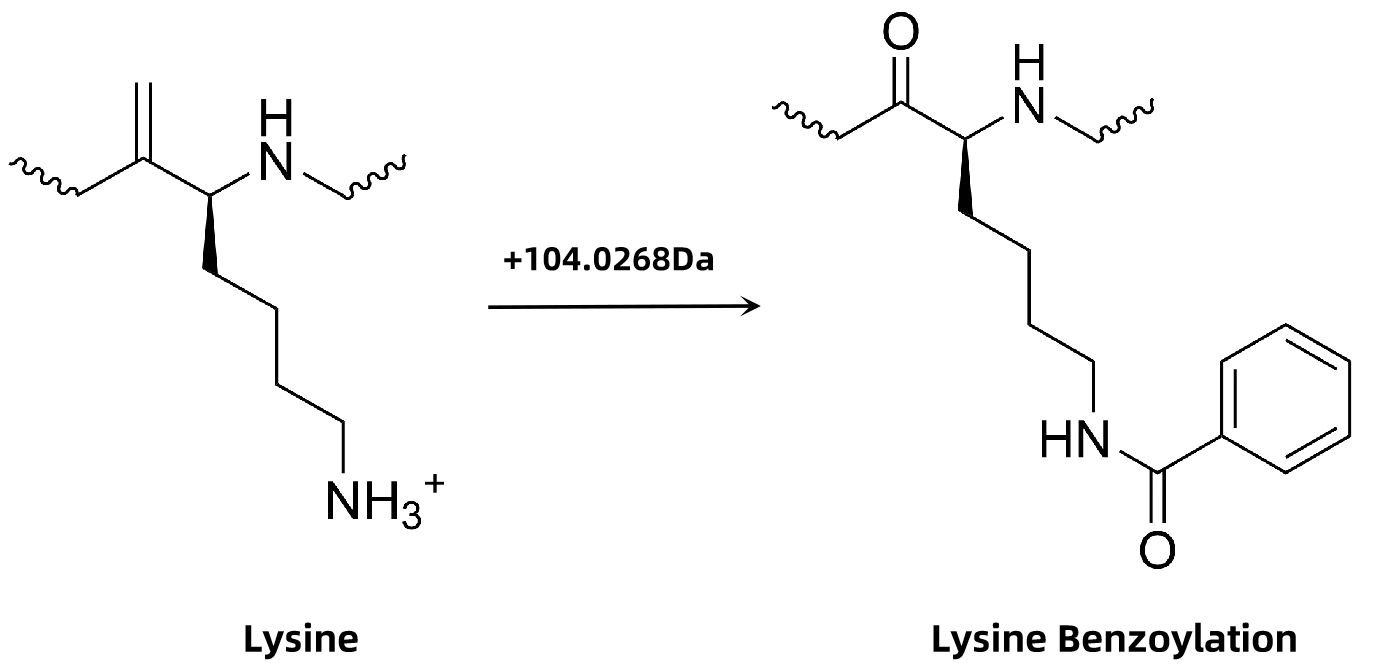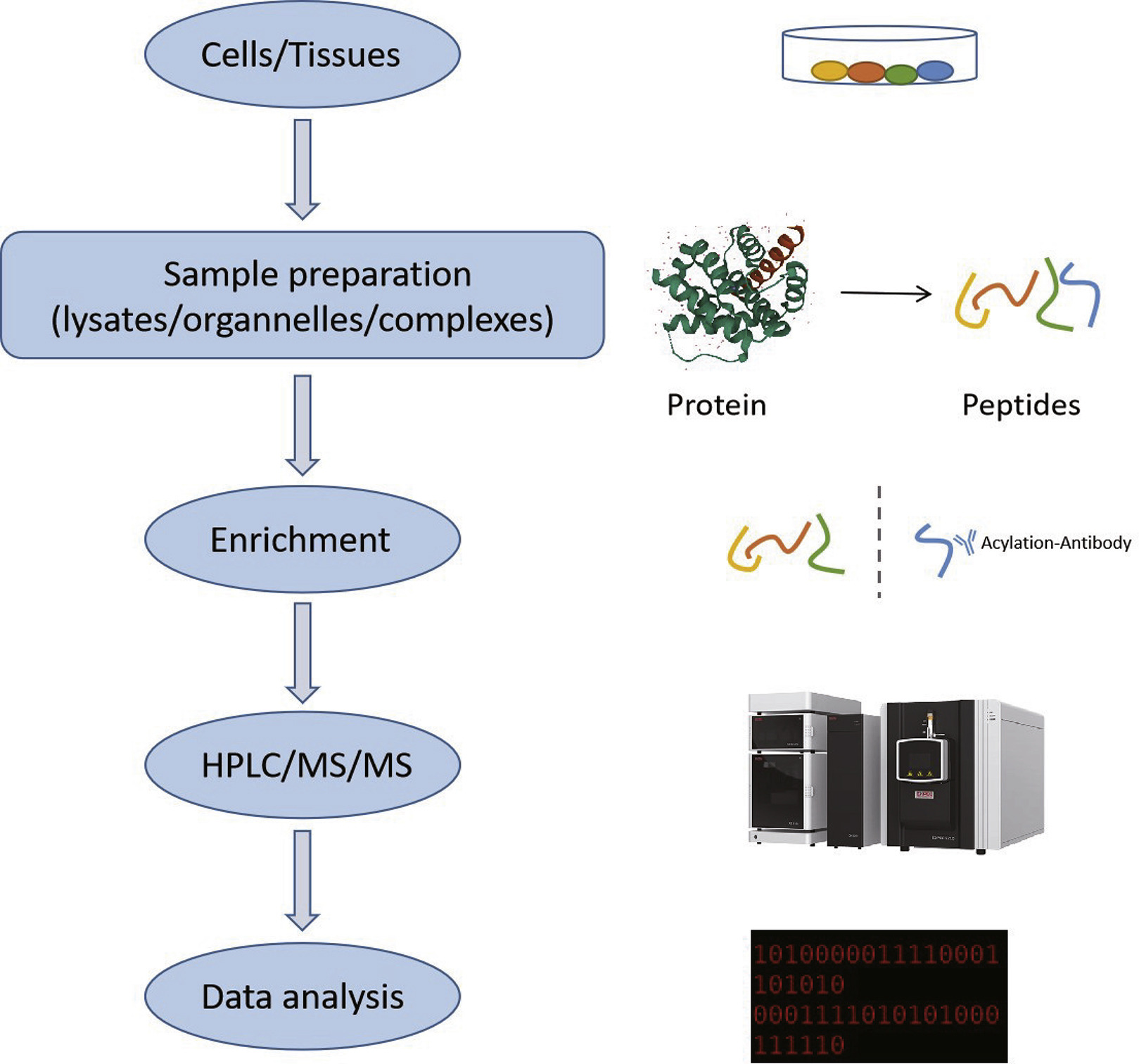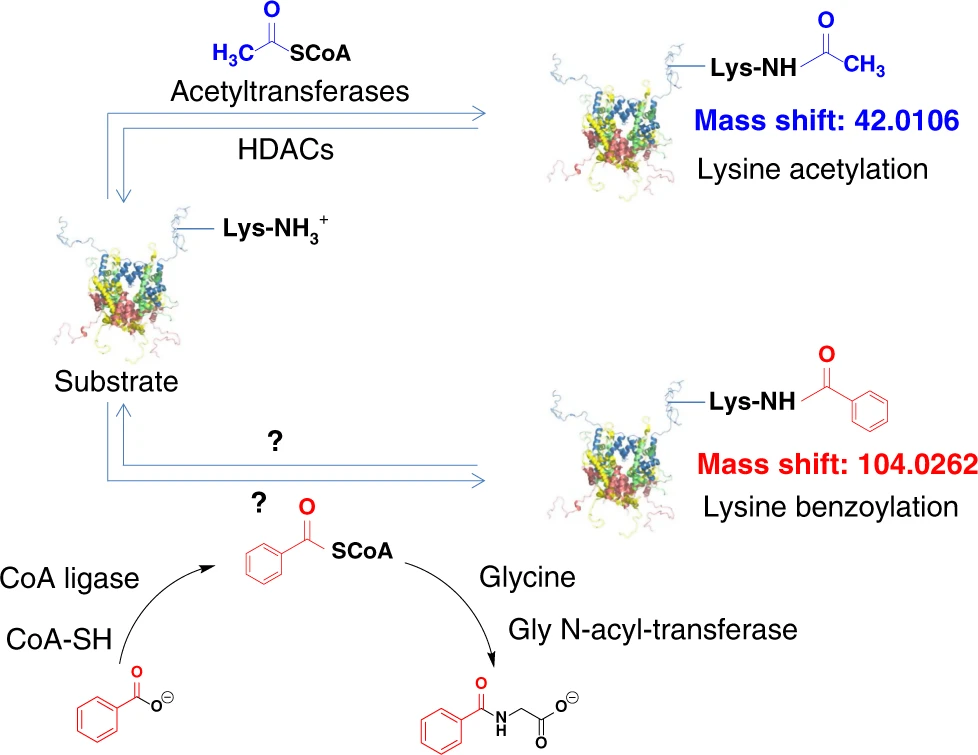Benzoylation Proteomics Analysis Service
Benzoylation proteomics analysis is a systematic analytical approach specifically targeting benzoylation, a type of protein post-translational modification. Benzoylation refers to the covalent attachment of benzoyl groups to protein lysine residues, affecting protein structure, activity, localization, and interactions, thereby regulating biological functions such as cellular metabolism, signal transduction, and gene expression. This technique typically employs high-resolution liquid chromatography-mass spectrometry (LC-MS/MS) combined with highly specific benzoylation enrichment strategies to comprehensively identify and quantify benzoylation modification sites on proteins.
Benzoylation proteomics analysis service is widely applied in cancer, neurodegenerative diseases, metabolic disorders, and immune diseases to uncover the critical roles of protein benzoylation in disease initiation and progression, screen potential biomarkers, and identify therapeutic targets for drug development. This service provides a powerful analytical tool for deeply understanding the biological significance and disease mechanisms associated with benzoylation modifications.

Figure 1. Lysine Benzoylation.
Services at MtoZ Biolabs
Leveraging state-of-the-art mass spectrometry and advanced proteomic analysis, the benzoylation proteomics analysis service provided by MtoZ Biolabs can identify protein benzoylation modification sites with high sensitivity and accuracy. This service includes benzoylated protein enrichment, mass spectrometry identification, and quantitative analysis, ensuring precise and reliable data on modification sites and their abundance changes.
Analysis Workflow
1. Sample Preparation
Proteins are extracted and digested into peptides to ensure suitability for subsequent analysis.
2. Specific Enrichment
Benzoylated peptides are enriched from samples using benzoylation-specific antibodies.
3. Mass Spectrometry Detection
High-resolution liquid chromatography-tandem mass spectrometry (LC-MS/MS) is employed for high-throughput identification and quantitative analysis of modified peptides.
4. Data Analysis
Bioinformatics software is utilized for identification of benzoylation modification sites, quantitative assessment of modification levels, and functional enrichment analysis.
5. Results Reporting
A detailed data report is provided, including information on benzoylation sites and functional annotations of modified proteins, to facilitate clients' in-depth research and validation.

Xu, Y X. et al. Molecular & Cellular Proteomics, 2022.
Figure 2. The MS Workflows for Benzoylation Proteomics.
Service Advantages
1. High Sensitivity and Precision
A high-resolution mass spectrometry (LC-MS/MS) platform is utilized to ensure accurate and sensitive identification of benzoylation modifications.
2. Specific Enrichment Strategy
Efficient benzoylation-specific antibody enrichment techniques are employed to enhance the identification coverage of target modified peptides.
3. Comprehensive Data Analysis
Provides precise qualitative and quantitative data, enabling in-depth analysis of benzoylated protein modification levels and biological functions.
4. Customized Experimental Solutions
MtoZ Biolabs offers flexible and personalized experimental designs tailored to clients' research requirements, facilitating studies of disease mechanisms and identification of therapeutic targets.
Applications
1. Cancer Research
Analyze the role of benzoylation modifications in cancer initiation and progression to identify potential biomarkers or therapeutic targets.
2. Metabolic Disease Research
Benzoylation proteomics analysis service can reveal the regulatory effects of benzoylation on metabolic pathways, exploring mechanisms underlying diseases such as diabetes and obesity.
3. Immune Disease Research
Investigate the functions of benzoylation in immune signaling pathways and identify potential therapeutic targets for autoimmune diseases.
4. Neurodegenerative Disease Research
Through studying the pathological roles of benzoylation in diseases such as Alzheimer’s and Parkinson’s, the benzoylation proteomics analysis service supports drug development.
Case Study
1. Lysine benzoylation is a histone mark regulated by SIRT2
This study aimed to investigate, from a proteomics perspective, the regulatory mechanisms of lysine benzoylation as a novel histone epigenetic modification. Mammalian cells were used as research subjects, employing high-resolution mass spectrometry (LC-MS/MS) combined with benzoylation-specific antibody enrichment to systematically identify and quantitatively analyze benzoylation sites on histone lysine residues, and to further explore the regulatory role of the enzyme SIRT2 on this modification. The results demonstrated that SIRT2 effectively removed benzoyl groups from histone lysine residues, dynamically regulating chromatin structure and gene transcriptional activity. The study concluded that SIRT2 is an important enzyme regulating histone lysine benzoylation, revealing the critical role of benzoylation modifications in chromatin biology and laying an essential foundation for further understanding of the biological functions and potential disease mechanisms associated with lysine benzoylation.

Huang, H. et al. Nature Communications, 2018.
Figure 3. Lysine Acetylation and Benzoylation.
Deliverables
1. Comprehensive Experimental Details
2. Materials, Instruments, and Methods
3. Data Analysis, Preprocessing, and Estimation
4. Bioinformatics Analysis
5. Raw Data Files
MtoZ Biolabs, an integrated chromatography and mass spectrometry (MS) services provider.
Related Services
How to order?







